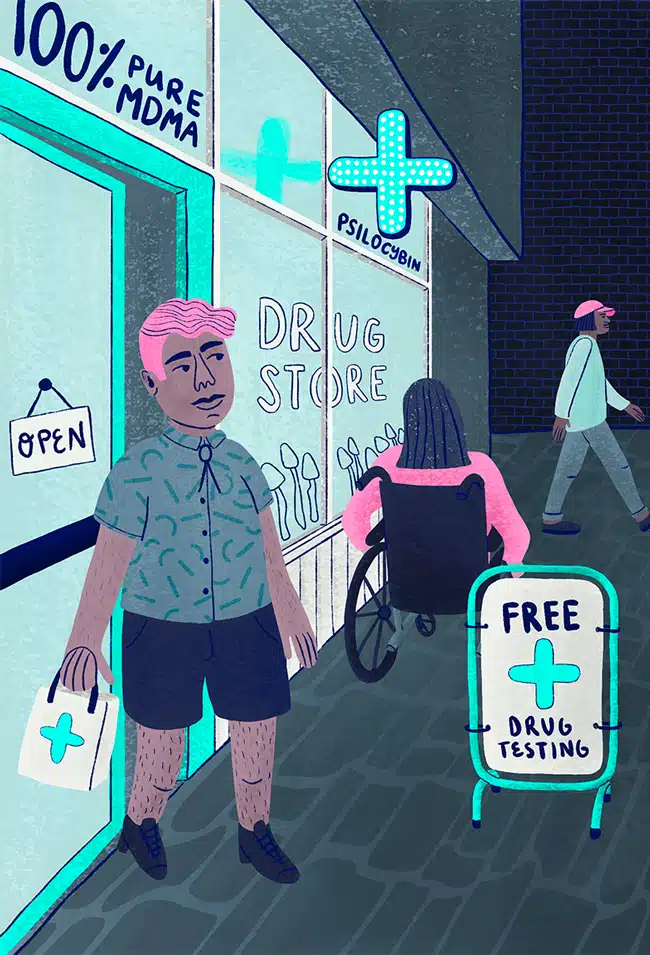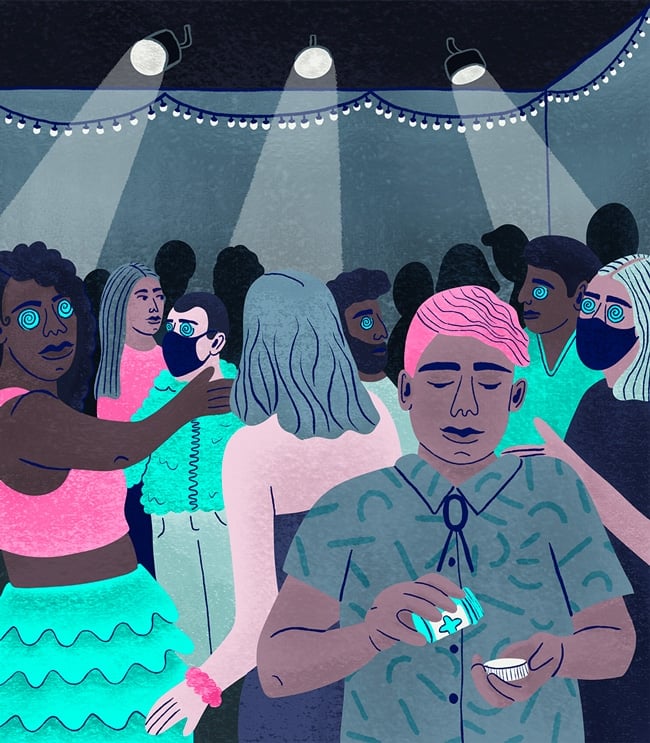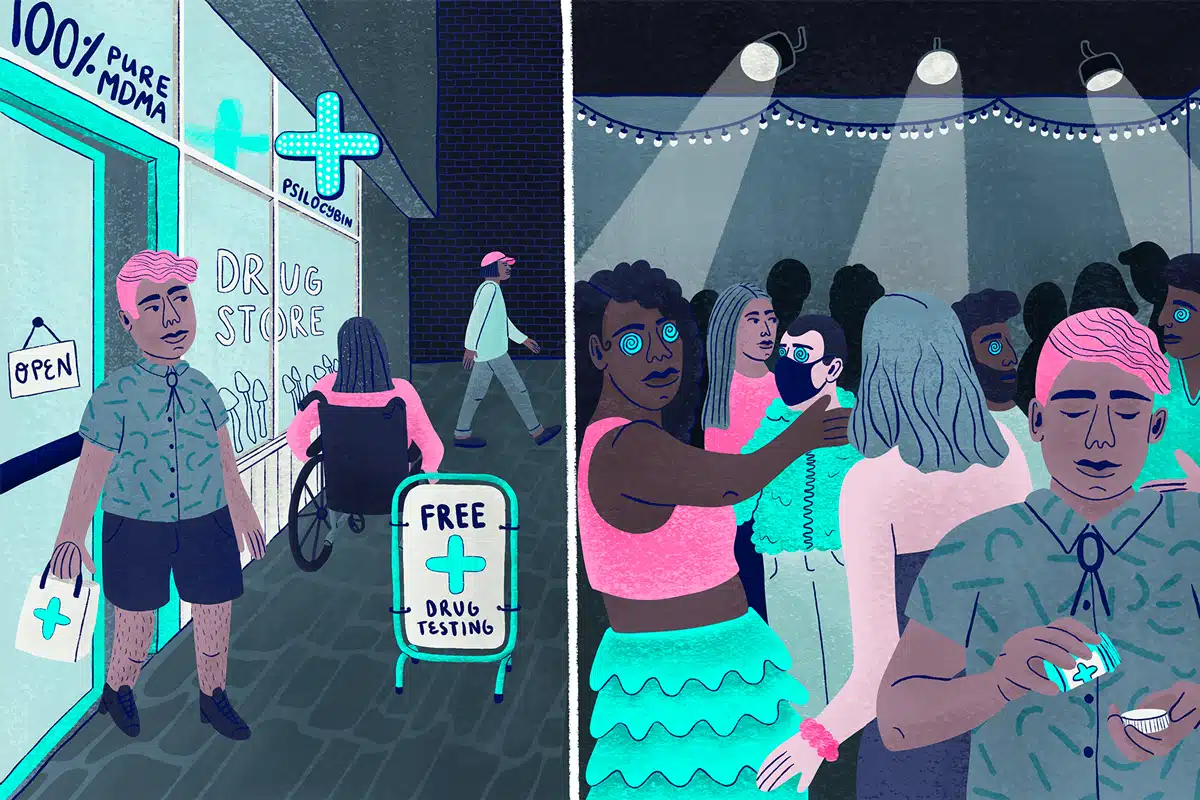A man standing in a nightclub scratches his cocaine-powdered nose while two women, sweating profusely and with pupils dilated from MDMA, jive nearby to the rhythm of techno. In between the bar and the dancefloor, a young man makes his way round to see who wants drugs. “Pills, ket, coke?” he asks. This scene repeats itself almost every day in hundreds of cities across the world. So what would change if drugs, already widely tolerated, became legal?
Perhaps clubs where drugs could be consumed would not serve alcohol—due to the heightened risk of mixing substances—and drug harm reduction services could be present to assist people who had taken too much. There would not be criminal dealers present. Instead, a nearby set of pharmacy-like shops could supply the demand. Nightclubs could make up the shortfall from no alcohol sales with higher ticket prices, experiential offers like spa services, and fancy mocktails.
On the macro level, the retail value of drugtrafficking crime is up to $652 billion, according to a 2017 report by Washington think tank Global Financial Integrity. If drugs were legal, taxes from this market could be reinvested into treatment and education, with reparations paid to communities that have suffered in the name of the drug war. That is, rather than the current situation in which drug proceeds ($150 billion a year in the US alone) are a key contributor to the five percent of global domestic product—likely a conservative estimate—laundered through shell businesses, banks, cash purchases of weapons, and real estate, with an insignificant fraction seized by authorities.
READ: Why All Drugs Should Be Legal

One may raise their eyebrows at the simplicity of these suggestions, but not long ago most people believed that the sun moved around the earth, homosexuality was evil, and smoking was not harmful to health. What else, short of a wholesale change in drug policy, would significantly disrupt an illegal global market unrivaled in value which has infiltrated politics, big business, and local high streets?
Regulating drugs, according to their risks, appears to be the only way to get a grip on the drug-related public health and security crisis engulfing much of the world. This would look like having drugs such as heroin and cocaine under strict licensing regimes with rationed adult-only sales from pharmacy-like outlets and potentially less strict regimes for lower risk drugs like cannabis, MDMA, and magic mushrooms—with all sales accompanied by personalized harm reduction consultations. As it stands, anyone who really wants a diverse array of drugs can buy them anyway and are often offered higher strength substances which are sometimes contaminated or not what they’re supposed to be at all.
A greater legal availability of low-risk drugs could also ease the growing global crisis which sees three million die a year from booze (many times more than those who die from illegal drugs). This could subsequently allow government officials to reorient healthcare budgets from treating the consequences of alcohol misuse and costly nightlong stays in hospitals. Despite opponents claiming legalization of substances increases their use, the feared canna-pocalypse has failed to materialize in the countries which have legalized cannabis, with no general uptick in usage.
How to Grow Shrooms Bundle
Take Both of Our Courses and Save $90!
The NGO Transform Drug Policy Foundation has called for state-licensed companies to be required to provide quality drugs at competitive prices, since they are currently vastly inflated due to prohibition, leading many people who use drugs into serious financial difficulties that can compound wider personal issues, incentivize criminality, and lead to destitution. In the US, an estimated $40 billion in potential productivity is lost per year among those incarcerated for (mostly non-violent) drug offenses. Serious drug reform could both liberate these people, and the drug-producer and transit countries where there has been the most drug-war violence.
READ: The Advantages of Psychedelic Prohibition

On a global level, regulation in Mexico, Afghanistan, Colombia, and other countries devastated by the futile war could potentially transform their economies for the better through the development of legal opium and coca markets—and the gradual disempowerment of the destabilizing impacts of organized crime groups. Violence is not necessarily an inevitable part of a drug trade but, since it is unregulated, the majority of added value accrues during smuggling. There is a lucrative and unparalleled bounty for rival organized crime groups to kill over.
Of course, even the most advanced democracies are not immune to corruption and cronyism, nor extreme violence. Free market legalization and an absence of controls could be even more dangerous than the current anarchy, with corporations able to aggressively market poorly regulated products to impressionable young people, much as the alcohol and tobacco industries have done in the past with devastating impacts. Antisocial public drug use could rise. Perhaps corporations would seek to capture the policy-making process and corrupt the regulatory process. Big Pharma could encourage vendors and pharmacy workers to boost sales of certain drugs—the opioid crisis in the US, in which doctors were incentivized to peddle highly addictive pills, has demonstrated the deadly consequences of this. It is also possible the cartels and drug gangs would seek to expand into other forms of criminal activity such as counterfeiting, trafficking, and extortion. They may also object to regulation, possibly violently, unless they are given a seat at the table.
But this speculation is no reason to maintain the status quo. Instead, it is an argument for ensuring that responsible regulation follows a legalization process, ideally using noncommercial models and strict controls over pricing an products to ensure private forces do not act in the interest of profit rather than public health. Even a strictly state-controlled model has obvious flaws and risks of exploitation. But surely states are better placed than criminals to manage these billions-dollar markets and the revenues they generate? Who else can be trusted to responsibly regulate? Plus, we already have experience of what good and bad practice in drug regulation looks like from the many legal drugs currently available in shops and pharmacies, and there is no reason why a new, more responsible model for other currently illegal drugs could not be formulated.
Given the resilient and growing demand for drugs, why should states not remove billions of dollars from the pockets of organized crime groups and instead collect substantial tax revenues, which could go toward drug services and other social programs—potentially helping to repair the harms from a century of drug war? Savings on law enforcement efforts and money lost to crime would represent good overall value for this endeavor. The US has spent around $1 trillion on the war on drugs, with $45 billion squandered each year—a tiny fraction of that has been invested in public health measures to reduce harms. And they don’t get to tax the proceeds from the sales. It’s time to try a different approach and legalize, regulate, and tax all drugs.
Excerpted and adapted from “Should All Drugs Be Legalized?: A Primer for the 21st Century” (Thames & Hudson, July 2022)
*This excerpt was originally published in DoubleBlind Magazine Issue 8.

DoubleBlind is a trusted resource for news, evidence-based education, and reporting on psychedelics. We work with leading medical professionals, scientific researchers, journalists, mycologists, indigenous stewards, and cultural pioneers. Read about our editorial policy and fact-checking process here.

DoubleBlind Magazine does not encourage or condone any illegal activities, including but not limited to the use of illegal substances. We do not provide mental health, clinical, or medical services. We are not a substitute for medical, psychological, or psychiatric diagnosis, treatment, or advice. If you are in a crisis or if you or any other person may be in danger or experiencing a mental health emergency, immediately call 911 or your local emergency resources. If you are considering suicide, please call 988 to connect with the National Suicide Prevention Lifeline.



